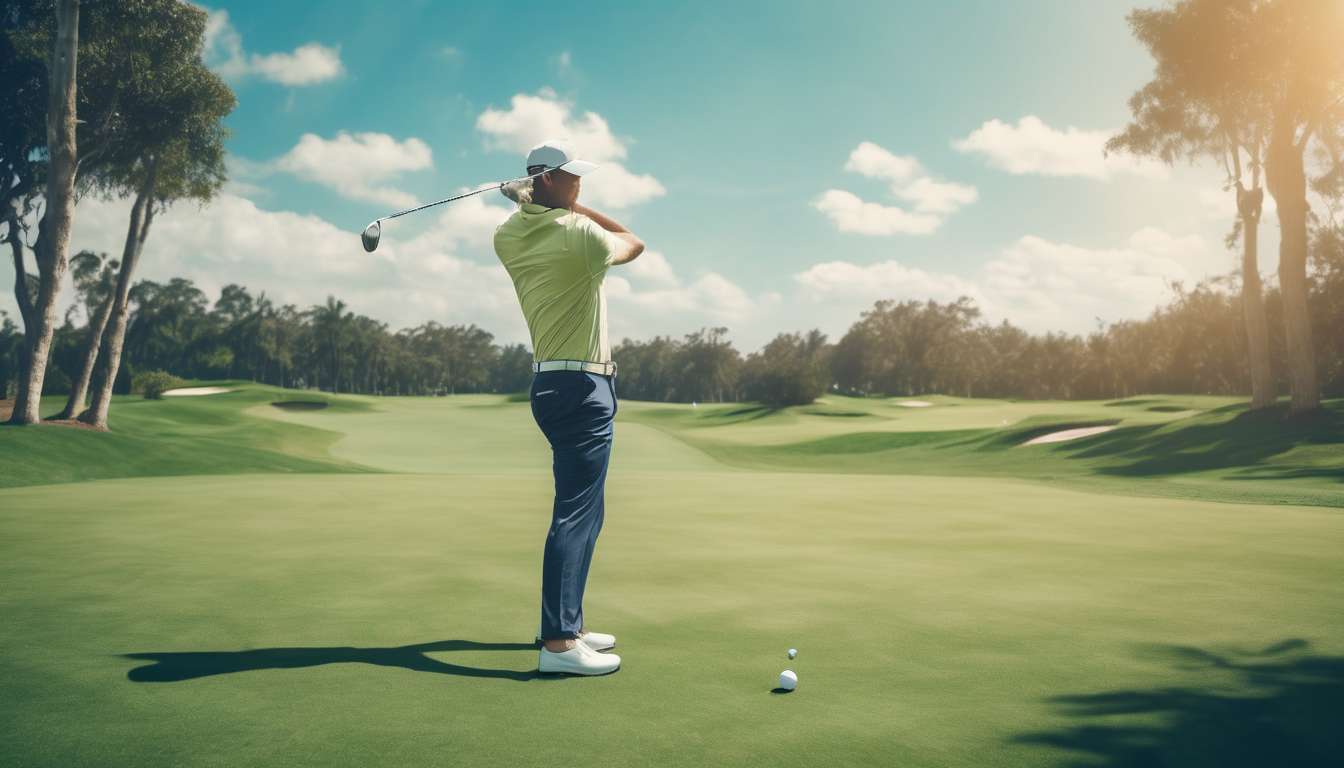Golf has always been more than just a game for us; it’s a passion, a pursuit of precision and grace that challenges both body and mind.
As avid enthusiasts and students of the sport, we’ve often marveled at the skill and consistency exhibited by champions. What sets them apart? How do they hone their craft to such an extraordinary level?
We decided to delve into the training methods that these golfing legends have relied upon to reach the pinnacle of success.
In this article, we explore seven distinct training techniques that champions across the globe swear by.
-
Innovative Practice Routines: Champions often employ creative and varied practice sessions that focus on different aspects of their game.
-
Mental Conditioning Exercises: Strengthening mental fortitude is key to maintaining focus and composure under pressure.
-
Physical Fitness Regimens: Tailored workouts help improve strength, flexibility, and endurance specific to golf.
-
Swing Analysis and Adjustment: Utilizing technology to analyze and refine swing mechanics.
-
Course Strategy and Management: Learning to navigate and strategize effectively on the course.
-
Short Game Precision: Focusing on putting and chipping to lower scores.
-
Consistent Feedback and Adaptation: Regular feedback from coaches to continuously adapt and improve.
Whether we’re seasoned players or newcomers to the fairways, these strategies promise to enhance our game and deepen our appreciation for the sport.
Join us as we uncover the secrets behind the success of golf’s greatest players.
Innovative Practice Routines
We’ve discovered several innovative practice routines that can revolutionize how golfers improve their skills. Together, we can embrace these new methods to enhance our performance and feel more connected on the green. By focusing on precision and strategy, we can transform our practice sessions into powerful tools that elevate our game.
Target Specific Areas of Weakness
- Incorporate drills that focus on specific weaknesses.
- Use data-driven strategies to pinpoint areas needing improvement.
- Tailor practice sessions to be both effective and efficient.
- Ensure efforts lead to tangible progress.
Practice with Intention
- Avoid mindlessly hitting balls.
- Set clear goals for each practice session.
- Maintain focus and motivation.
- Foster a sense of belonging within the golf community by sharing successes and challenges.
Power of Repetition
- Engage in consistent practice.
- Hone precision and skills.
- Build confidence and competitiveness as a player.
By adopting these methods, we can significantly enhance our skills and enjoy a more rewarding experience on the green.
Mental Conditioning Exercises
In our quest to enhance our golf game, mental conditioning exercises play a crucial role in building focus and resilience on the course. Together, we can develop a strong mindset that allows us to stay calm under pressure and execute our shots with precision. By incorporating mental strategies into our practice, we align ourselves with champions who understand the importance of psychological strength in golf.
One effective strategy is visualization. Let’s picture the entire course in our minds, imagining each shot with perfect accuracy. This practice helps us create a mental map, enhancing our strategic approach to each hole.
Mindfulness exercises also bolster our concentration. They help us let go of distractions and maintain sharp focus.
Another key element is positive self-talk. Encouraging words boost our confidence and reinforce our belief in our abilities.
As we adopt these mental conditioning exercises, we join a community of golfers who value the power of the mind, striving for excellence and camaraderie on the course.
Physical Fitness Regimens
To elevate our golf performance, we need a well-rounded physical fitness regimen that builds strength, flexibility, and endurance. By incorporating regular practice into our routine, we can develop the muscle memory essential for executing precise shots.
A strategic mix of exercises ensures that we’re not only physically fit but also ready to tackle any challenge on the course. These exercises include:
- Strength training: Enhances our power, allowing us to drive the ball further with precision.
- Flexibility exercises: Activities like yoga improve our range of motion, making our swings smoother.
- Endurance-building activities: Running or cycling helps us maintain focus throughout a round of golf, ensuring our strategy remains sharp from the first tee to the final putt.
By committing to a comprehensive fitness regimen, we foster an inclusive environment where everyone can share their progress and celebrate collective achievements. This reinforces our sense of belonging and camaraderie in the golfing community.
Swing Analysis and Adjustment
To optimize our golf swings, we must meticulously analyze and adjust each phase of our movement to enhance accuracy and control. This process isn’t just about hitting the ball harder; it’s about understanding the intricate details of our swing mechanics. By focusing on precision, we can eliminate inconsistencies and improve our overall performance on the course.
Together, we can develop a strategy that includes regular practice sessions, where we break down our swings into manageable parts. We should use video analysis tools that provide instant feedback, allowing us to make necessary adjustments in real-time.
With each session, we grow closer as a community, sharing tips and insights that benefit everyone. Our collective goal is to refine our swings to the point where precision becomes second nature.
When we practice with purpose and embrace continuous improvement, we’re not just playing golf; we’re building a stronger bond with fellow enthusiasts who share a passion for the game.
Let’s keep pushing each other to new heights.
Course Strategy and Management
Managing Our Approach on the Golf Course
Understanding each hole’s unique challenges and making informed decisions are crucial for effective navigation. It is important to practice our strategy, recognizing the significance of each shot’s placement to set up the next one.
By carefully analyzing:
- The layout
- Hazards
- Pin positions
we can craft a game plan that maximizes our strengths and minimizes risks.
Visualization and Confidence
When walking the course, it is essential to visualize each shot with precision. This practice helps us:
- Avoid unnecessary strokes
- Maintain confidence throughout the round
Planning isn’t just for the pros; it fosters camaraderie as we share insights and tips with fellow golfers striving for excellence.
Incorporating Strategy into Practice
To incorporate strategy into our practice sessions, we should simulate real course scenarios. This involves:
- Mapping out different approaches to each hole
- Adjusting tactics as needed
Together, let’s embrace course management to elevate our game and enjoy the shared journey toward improvement.
Short Game Precision
Mastering our short game demands focus on accuracy and touch, allowing us to shave crucial strokes off our scores. By honing our precision, we become part of an elite group that understands the power of the short game. It’s not just about getting the ball in the hole; it’s about feeling connected to each shot and creating a strategy that aligns with the course and our unique style.
To achieve this, we must commit to regular practice sessions. These sessions should be intentional and focus on different aspects of our short game, such as:
- Chipping
- Pitching
- Putting
We can also incorporate drills that challenge our precision and help us develop confidence in our strokes.
Strategically practicing on various terrains and green speeds further enhances our adaptability and ensures we’re prepared for any situation.
As we refine our skills together, we create a sense of camaraderie and belonging, united by our shared pursuit of excellence and precision in the short game.
Consistent Feedback and Adaptation
Regular feedback and adaptability are essential components for mastering the short game.
When engaging in practice, it’s not just about repetition. It’s about refining our strategy and honing our precision. By actively seeking feedback, we can pinpoint areas that need adjustment.
Sources of Feedback:
- Coaches
- Peers
- Technology like swing analysis apps
This collective insight fosters a sense of camaraderie as we all strive towards the same goal—improvement.
Adapting our approach based on feedback is where true progress lies. We must remain open to change, adjusting:
- Stance
- Grip
- Mindset
This adaptability isn’t just a skill; it’s a shared journey that strengthens our bonds as a community of golfers. Together, we learn from each other’s experiences and grow in our understanding of the game.
By building a supportive network, we encourage each other to push our limits and achieve new levels of performance.
Secrets of Golf Champions
Many golf champions attribute their success to a blend of mental toughness, meticulous preparation, and unwavering dedication.
As a community of aspiring champions, we understand that practice involves more than just repetitive swings. It’s about:
- Refining our strategy
- Honing our precision
We can’t overlook the importance of a well-crafted game plan, tailored to our strengths and weaknesses. This strategic approach allows us to:
- Anticipate challenges
- Adapt swiftly on the course
Precision, a hallmark of champions, requires our full attention. Every shot demands:
- Focus
- Calculated execution
These details make the difference and by embracing this mindset, we sharpen our skills and elevate our game.
Let’s not forget the camaraderie that fuels our journey. Sharing insights and experiences with fellow golfers fosters:
- A sense of belonging
- Collective growth
Together, we push boundaries and celebrate each other’s successes.
In our pursuit of excellence, we embody the secrets of golf champions: practice, strategy, and precision.
What is the recommended diet for optimal golf performance?
For optimal golf performance, we recommend a balanced diet that includes:
- Lean proteins
- Whole grains
- Fruits
- Vegetables
Hydration is key:
- Drink plenty of water throughout the day.
Before playing, keep in mind:
- Avoid heavy meals.
- Opt for light snacks instead.
Important Reminder:
Fueling our bodies with the right nutrients helps maintain focus and energy on the course. Remember, what we eat plays a crucial role in our golf performance!
How do professional golfers manage travel and tournament schedules?
As professional golfers, we manage travel and tournament schedules by meticulously planning our itinerary. This involves:
- Booking accommodations close to the course
- Ensuring we have ample time for rest and practice
We utilize technology to stay organized by:
- Tracking flights
- Using apps for seamless planning
Our team collaborates to coordinate logistics, which enables us to focus on our game.
Prioritizing self-care and mental preparation is crucial, helping us perform at our best, no matter where we’re playing.
What type of equipment do golf champions prefer?
We champions prefer high-quality equipment that helps us perform at our best.
From top-of-the-line clubs to precision-engineered golf balls, our gear is carefully chosen to enhance our game.
Quality equipment not only gives us confidence on the course but also helps us achieve consistent results.
When it comes to our tools of the trade, we spare no expense to ensure we have the best.
Conclusion
In conclusion, mastering these 7 golf training methods will elevate your game to championship level.
By incorporating:
- Innovative Practice Routines
- Mental Conditioning Exercises
- Physical Fitness Regimens
- Swing Analysis
- Course Strategy
- Short Game Precision
- Consistent Feedback
you’re on the path to success.
Stay dedicated, adapt as needed, and embrace the secrets of golf champions to reach your full potential on the course.




